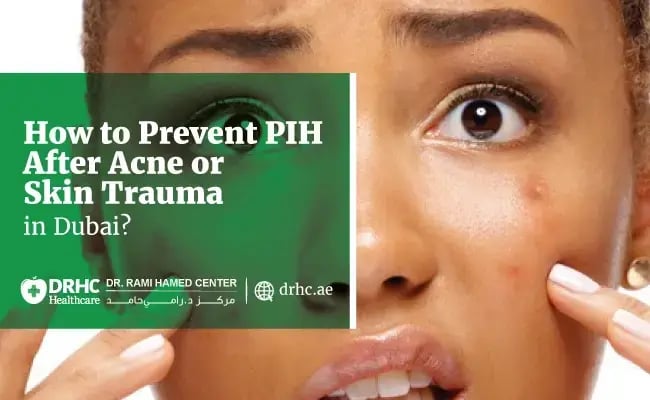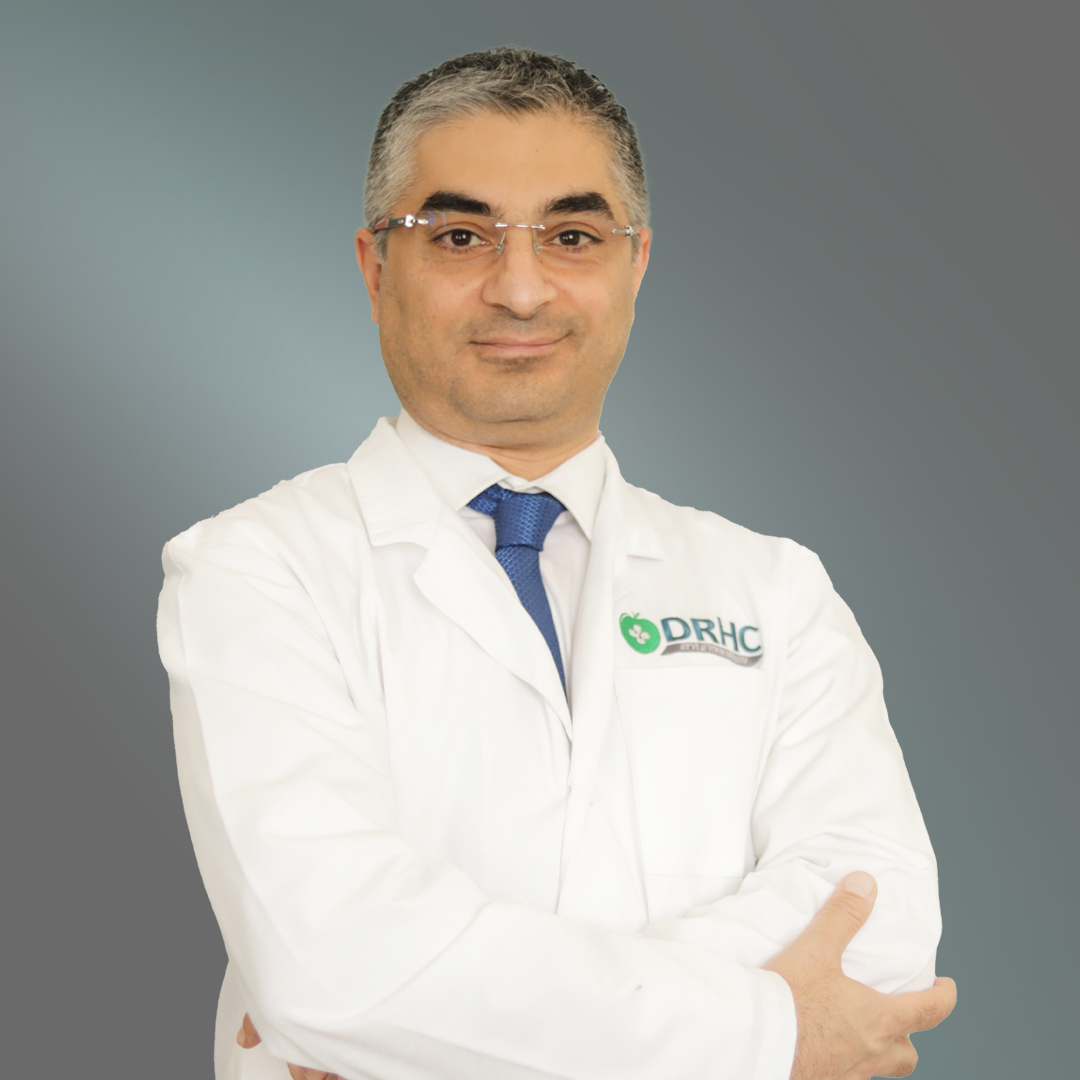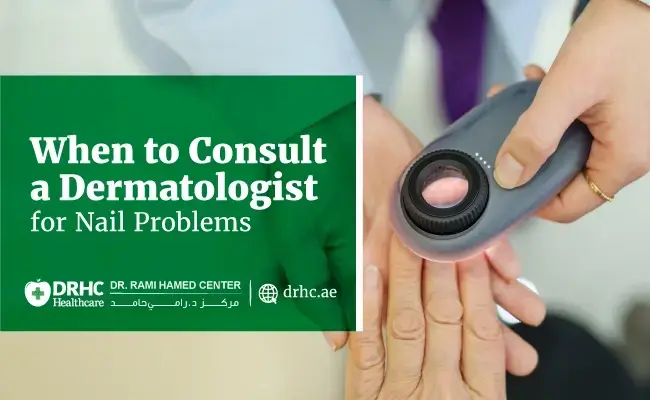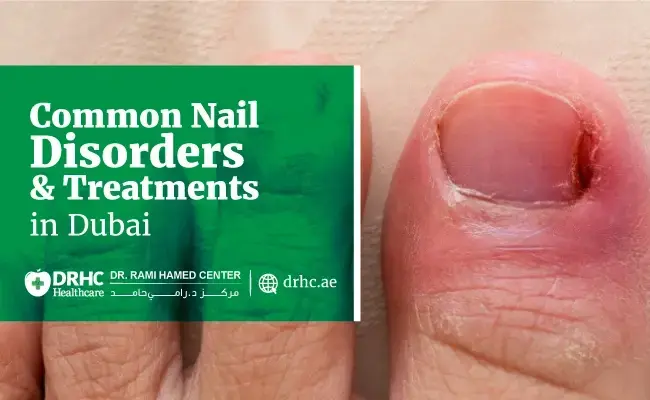
Many people in Dubai experience dark spots or uneven skin tone after acne, burns, or cosmetic treatments. These lingering marks—known as post-inflammatory hyperpigmentation (PIH)—can be just as distressing as the initial skin problem itself.
At Dr. Rami Hamed Center (DRHC Dubai), we understand how frustrating it can be to finally clear your acne or heal from an injury, only to notice dark patches that take weeks or months to fade. The good news is that PIH can often be prevented with the right care and guidance.
What Is Post-Inflammatory Hyperpigmentation (PIH)?
Post-inflammatory hyperpigmentation is the skin’s natural response to inflammation or trauma. When the skin becomes irritated or injured—whether from acne, burns, cosmetic treatments, or even scratching—it produces excess melanin, the pigment that gives skin its color.
As the skin heals, the area may darken, leaving brown, gray, or reddish spots. While PIH isn’t harmful, it can be stubborn and affect self-confidence.
Why PIH Is Common in Dubai
Living in Dubai’s sunny and warm climate increases the risk of PIH. The strong UV rays stimulate melanin production, deepening existing pigmentation and slowing the healing process. Heat, humidity, and frequent sun exposure can also worsen acne and inflammation—factors that trigger pigmentation.
This is why protecting your skin before and after acne, cosmetic procedures, or any skin injury is especially important in Dubai.
How to Prevent PIH After Acne or Skin Trauma
1. Avoid Picking or Squeezing Acne
It’s tempting to pop pimples or pick at scabs, but this can worsen inflammation and push pigment deeper into the skin. Allow acne or minor wounds to heal naturally. If you struggle with persistent breakouts, seek professional acne treatment at DRHC Dubai—we can help control acne safely and reduce the risk of marks or scars.
2. Prioritize Sun Protection
Sun exposure is one of the biggest causes of PIH. Protecting your skin from UV rays is essential every day, not just at the beach.
- Apply a broad-spectrum sunscreen (SPF 30 or higher) daily.
- Reapply every 2–3 hours if you’re outdoors.
- Wear a hat or seek shade whenever possible.
Even a few minutes of unprotected sun exposure can darken healing spots, so consistency is key.
3. Keep Skin Calm After Cosmetic Treatments
After laser therapy, chemical peels, or microneedling, the skin is more sensitive and prone to pigmentation.
- Avoid direct sunlight for several days post-procedure.
- Use gentle cleansers and fragrance-free moisturizers.
- Follow all aftercare instructions provided at DRHC Dubai to ensure proper healing and prevent pigmentation.
4. Use Gentle Brightening Ingredients
Certain skincare ingredients can help prevent or lighten PIH by reducing inflammation and balancing melanin production. Examples include:
- Niacinamide – calms redness and minimizes discoloration
- Vitamin C – supports skin repair and brightens tone
- Azelaic acid or licorice extract – safe, mild options for sensitive skin
Before starting any brightening or exfoliating product, it’s best to consult a dermatologist to ensure it’s right for your skin type.
5. Treat Acne Early
The sooner acne is treated, the lower the chance of inflammation that leads to PIH. At DRHC Dubai, we provide personalized acne management using advanced dermatological treatments, including medical facials, laser therapy, and prescription-based skincare tailored to your needs.
Common Questions About PIH
Will PIH fade on its own?
Mild pigmentation may fade over time, but this can take months. Consistent sun protection and proper skincare can speed up recovery.
Can PIH be permanent?
In most cases, PIH fades gradually. However, deeper pigmentation may need professional treatments like chemical peels or laser therapy available at DRHC Dubai.
Is PIH the same as acne scars?
No. PIH is pigmentation—flat dark spots—while acne scars usually involve changes in skin texture, such as pits or raised areas.
Professional Treatments for PIH in Dubai
For persistent or widespread pigmentation, professional care may be needed. Dermatologists at Dr. Rami Hamed Center offer advanced, safe, and effective options such as:
- Chemical Peels – remove damaged skin layers and encourage new cell growth.
- Laser Treatments – target excess pigment without harming surrounding skin.
- Medical-Grade Skincare – customized regimens to control inflammation and protect the skin barrier.
Each treatment plan at DRHC is personalized to your skin type, tone, and lifestyle—ensuring natural, long-lasting results.
Final Thoughts
Post-inflammatory hyperpigmentation can be emotionally challenging, but it doesn’t have to be permanent. With proper prevention, sun protection, and professional care, your skin can recover its natural, even tone.
If you’re struggling with acne marks, dark spots, or pigmentation after cosmetic procedures, visit Dr. Rami Hamed Center (DRHC Dubai). Our dermatology specialists are here to guide you through a safe and effective treatment plan designed to help your skin heal beautifully.
📞 Call / WhatsApp: +97142798200
📍 Visit Us: Dr Rami Hamed Center, Dubai Healthcare City
🌐 Website: www.drhc.ae
Topic: Dermatology







.webp)

Leave a comment